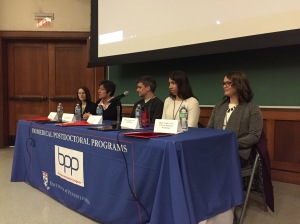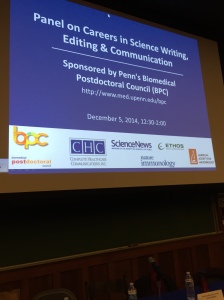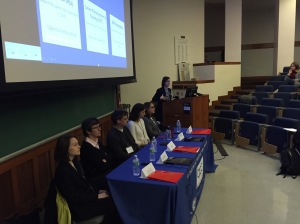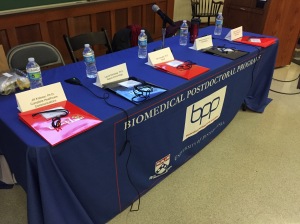Penn BPC Sponsors Panel on Careers in Science Writing
By Liisa Hantsoo, Ph.D.

Panelists discussed a variety of careers for PhDs in science writing and communication. Image Credit: Daphne Avgousti.
The Biomedical Postdoctoral Council (BPC) wrapped up an eventful 2014 with a panel on careers in science writing, editing and communication. The panel, a joint effort between BPC’s Career Enhancement and Training Committee (CET), the Postdoctoral Editors Association (PEA) and the BPC Newsletter, included writers and editors from a variety of publications. Panelists were Megan Angelini, Ph.D. (Editorial Acquisitions Specialist, American Society for Microbiology), Bethany Brookshire, Ph.D. (Science Writer, ScienceNews; @SciCurious), Tim Connelly, Ph.D. (Medical Writer, Ethos Health Communications), Laurie Dempsey, Ph.D. (Senior Editor, Nature Immunology), and Jill Kolesar, Ph.D. (Medical Writer, Complete Healthcare Communications).
The panel began with each panelist describing his or her career path. While all panelists had doctorates in the biosciences, some knew earlier on in their academic training that they were interested in a career outside of the lab. In order to gain experience in science communication, many of the panelists started small – editing manuscripts for other lab members during graduate school, organizing journal clubs, starting a science blog, freelancing, or writing and editing for groups such as the PEA or BPC Newsletter. All of the panelists expressed a passion not just for science, but also for communicating it to others. Once they had discovered their enthusiasm for communicating about science, they went to stake out their career paths. To transition into science communications, the panelists employed a range of tactics, from informational interviews and networking at conferences to making formal job applications.
In discussing their current positions, the panelists outlined a range of duties. Kolesar emphasized that in her position, the focus is looking at data, and being able to synthesize and communicate it in a condensed, clear way. Brookshire stressed reliability, mentioning that being able to consistently produce engaging and cutting edge writing is key in her position. Dempsey related how her broad background in the sciences has been beneficial in her role as a Senior Editor, as she is able to evaluate articles across a range of topics. Each panelist reflected on the variety of knowledge and duties involved in their positions, and that defining a “typical” day is difficult. The panelists all emphasized that if you’re interested in science communications, start exploring now. They mentioned an array of resources for getting started, including science writing certificate programs and fellowships, books such as The Science Writers Handbook (1) or Brookshire’s upcoming Complete Guide to Science Blogging (2), and participating in writing and editing opportunities within your own university.
References
1) Hayden, T. & Nijhuis, M. (eds). (2013). The Science Writers’ Handbook: Everything You Need to Know to Pitch, Publish, and Prosper in the Digital Age. Boston, MA: Da Capo Press.


